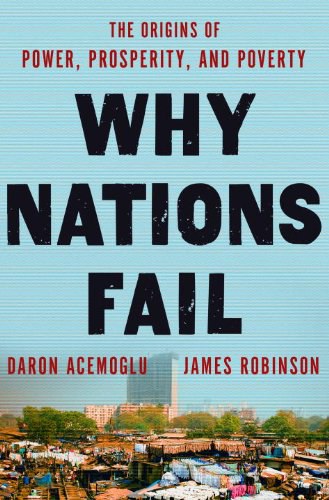
书名:Why Nations FailTheOriginsofPower,Prosperity,andPoverty
作者:DaronAcemoglu/JamesRobinson
译者:
ISBN:9780307719218
出版社:CrownBusiness
出版时间:2012-3-20
格式:epub/mobi/azw3/pdf
页数:544
豆瓣评分: 7.6
书籍简介:
Review "'You will have three reasons to love this book. It's about national income differences within the modern world, perhaps the biggest problem facing the world today. It's peppered with fascinating stories that will make you a spellbinder at cocktail parties – such as why Botswana is prospering and Sierra Leone isn't. And it's a great read. Like me, you may succumb to reading it in one go, and then you may come back to it again and again.' (Jared Diamond, Pulitzer-prize-winning author of bestselling books including 'Guns, Germs, and Steel' and 'Collapse')" ~~~~~~~~~~~~~~~~~~~~~~~~~~~~~~~~~~ Product Description This is a provocative new theory of political economy explaining why the world is divided into nations with wildly differing levels of prosperity. Why are some nations more prosperous than others? "Why Nations Fail" sets out to answer this question, with a compelling and elegantly argued new theory: that it is not down to climate, geography or culture, but because of institutions. Drawing on an extraordinary range of contemporary and historical examples, from ancient Rome through the Tudors to modern-day China, leading academics Daron Acemoglu and James A. Robinson show that to invest and prosper, people need to know that if they work hard, they can make money and actually keep it – and this means sound institutions that allow virtuous circles of innovation, expansion and peace. Based on fifteen years of research, and answering the competing arguments of authors ranging from Max Weber to Jeffrey Sachs and Jared Diamond, Acemoglu and Robinson step boldly into the territory of Francis Fukuyama and Ian Morris. They blend economics, politics, history and current affairs to provide a new, powerful and persuasive way of understanding wealth and poverty. They offer a pragmatic basis for the hope that at 'critical junctures' in history, those mired in poverty can be placed on the path to prosperity – with important consequences for our views on everything from the role of aid to the future of China.
作者简介:
About the Author
Daron Acemoglu is the Killian Professor of Economics at MIT. He received the John Bates Clark Medal.
http://econ-www.mit.edu/faculty/acemoglu/
James Robinson is a political scientist and economist and the Florence Professor of Government at Harvard University, and a world-renowned expert on Latin America and Africa.
http://scholar.harvard.edu/jrobinson
They are the authors of Economic Origins of Dictatorship and Democracy, which won numerous prizes (http://book.douban.com/subject/1841848/)
书友短评:
@ Zjjackiez 弃书。本来对这书有极高的期待,毕竟作者是MIT经济学教授,但看了大半本后发现只剩广度可以夸了。除了知道了很多历史故事,补足了我对Chichen Itza的认知之外,几乎没有给我任何站得住脚的观点,更不要说洞见。把不同国家简单粗暴地在政治制度和经济体系划分为Extractive和Inclusive,然后就开始cherry-picking讲extractive的政治体系如何阻碍经济发展,如何就算取… @ 夕岸 吐槽太多,论证不够。 @ 一位热心的网友 课本XD @ 以太 啃完了。 @ c h l 四星献给它的厚度!来回来去来回来去来回来去地说几个既不深刻也不新颖还以偏概全的观点。。。不过通过阅读此书我增长了一些亚非拉历史和地理姿势 @ 山咔咔 比较一般 @ Ricarzen 中东小哥看书状 @ Tev 兜兜转转一圈wrap up了这本. INSTITUTION vs institution. 就又是那种你知道latter才是潮流但你还是喜欢former的时候 @ Sprittte 以前读的,今天想起来了,和《枪菌铁》对照着看吧。 @ 人在鹭洲 社会科学方面的普适模型,难免多少会有削足适履论点先行的问题,本书也没能例外。不过就算是作为知识普及,也还是很值得一读。我最不满意的地方是,实在太啰嗦:举一反三还不够,非得反十反一百,生生把一篇文章注水成一块转头。
Contents
Preface
Why Egyptians filled Tahrir Square to bring down Hosni Mubarak and what it means for our understanding of the causes of prosperity and poverty
1. So Close and Yet So Different
Nogales, Arizona, and Nogales, Sonora, have the same people, culture, and geography. Why is one rich and one poor?
2. Theories That Don't Work
Poor countries are poor not because of their geographies or cultures, or because their leaders do not know which policies will enrich their citizens
3. The Making of Prosperity and Poverty
How prosperity and poverty are determined by the incentives created by institutions, and how politics determines what institutions a nation has
4. Small Differences and Critical Junctures: The Weight of History
How institutions change through political conflict and how the past shapes the present
5. "I've Seen the Future, and It Works": Growth Under Extractive Institutions
What Stalin, King Shyaam, the Neolithic Revolution, and the Maya city-states all had in common and how this explains why China?s current economic growth cannot last
6. Drifting Apart
How institutions evolve over time, often slowly drifting apart
7. The Turning Point
How a political revolution in 1688 changed institutions in England and led to the Industrial Revolution
8. Not on Our Turf: Barriers to Development
Why the politically powerful in many nations opposed the Industrial Revolution
9. Reversing Development
How European colonialism impoverished large parts of the world
10. The Diffusion of Prosperity
How some parts of the world took different paths to prosperity from that of Britain
11. The Virtuous Circle
How institutions that encourage prosperity create positive feedback loops that prevent the efforts by elites to undermine them
12. The Vicious Circle
How institutions that create poverty generate negative feedback loops and endure
13. Why Nations Fail Today
Institutions, institutions, institutions
14. Breaking the Mold
How a few countries changed their economic trajectory by changing their institutions
15. Understanding Prosperity and Poverty
How the world could have been different and how understanding this can explain why most attempts to combat poverty have failed
Acknowledgments
Bibliographical Essay and Sources
References
Index
· · · · · ·
添加微信公众号:好书天下获取
 好书天下
好书天下
评论前必须登录!
注册